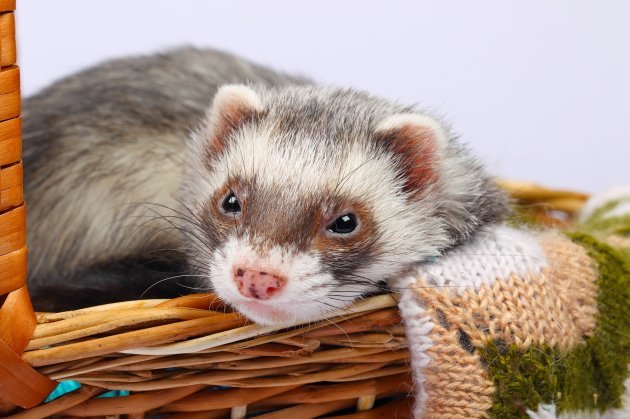
Black sable ferrets, with their sleek fur and playful personalities, can face specific health issues. From skin problems to digestive troubles, knowing what to watch out for can make a world of difference. In this guide, we’ll explore common health issues that black sable ferrets encounter and, more importantly, how you can prevent them. Let’s dive into the nitty-gritty of ferret health.
Understanding Common Health Issues in Ferrets
Ferrets are delightful little creatures, but they’re not without their quirks and vulnerabilities. Similar to how humans can catch colds or suffer from allergies, ferrets can face a variety of health concerns. Here’s a closer look at some of the more common issues that can affect your black sable ferret:
Adrenal Disease
Adrenal disease is one of the most prevalent health issues in ferrets, especially as they age. It occurs when the adrenal glands produce too many hormones, leading to symptoms like hair loss, weight loss, and even behavioral changes. You might notice your ferret scratching at their skin more often or becoming more irritable.
Preventing adrenal disease starts with regular vet check-ups. Early detection is key, as your vet can help manage the symptoms and keep your ferret comfortable. Pay attention to any changes in your ferret’s fur or behavior. If you spot something off, don’t wait—schedule a vet appointment.
Insulinoma
Insulinoma is another serious health issue that’s common in ferrets. This condition occurs when a tumor forms in the pancreas, leading to excessive insulin production. Symptoms include weakness, lethargy, and even seizures. It can be frightening to witness, especially if you’re not sure what’s happening.
To prevent insulinoma, ensure your ferret has a proper diet and avoid overfeeding them sugary treats. A balanced diet helps keep their blood sugar levels stable. Regular vet visits are also important, as they can monitor your ferret’s health and catch any changes early.
Skin Problems: The Itchy Truth
Black sable ferrets can be prone to skin issues just like any other animal. These problems can range from allergies to infections, and they can be a real nuisance for both you and your pet.
Allergies
Allergies in ferrets can stem from various sources, including food, dust, and even certain fabrics. If your ferret is constantly scratching or you notice red patches on their skin, it might be time to investigate. Allergies can sometimes lead to secondary infections, making things even more complicated.
To prevent allergies, maintain a clean living environment. Regularly wash their bedding and play areas, and consider switching to hypoallergenic food if you suspect dietary issues. Identifying the source of the allergy might take some detective work, but it’s worth it for your furry friend’s comfort.
Fungal Infections
Fungal infections can also affect ferrets, particularly if they are kept in damp or unclean conditions. Symptoms may include hair loss, itching, and skin lesions. These infections can be particularly stubborn, requiring veterinary treatment to clear them up.
Make sure your ferret’s living space is dry and clean. Regular grooming can help, too, as it not only keeps them looking good but also allows you to check for any signs of trouble. If you notice anything unusual, don’t hesitate to reach out to your vet for advice.
Digestive Issues
Your ferret’s digestive health is vital. A happy stomach equals a happy ferret. Unfortunately, various problems can arise, leading to discomfort and distress.
Gastrointestinal Blockages
Ferrets are curious little creatures, and they often get themselves into trouble by chewing on or swallowing things they shouldn’t. This can lead to gastrointestinal blockages, which can be life-threatening. Symptoms include vomiting, lethargy, and a lack of appetite.
To prevent these blockages, keep small objects and harmful substances out of reach. Providing plenty of safe toys can help satisfy their curiosity in a healthier way. If you ever suspect your ferret has swallowed something they shouldn’t have, you need to see a vet immediately.
Diarrhea and Constipation
Ferrets can also face issues like diarrhea and constipation, often stemming from dietary changes or stress. An abrupt switch in their food can wreak havoc on their stomachs. If you notice your ferret having loose stools or straining to go, it’s worth investigating.
The key to prevention here is a consistent, high-quality diet. When changing your ferret’s diet, do it gradually to minimize digestive upset. If problems persist, consult your vet for advice tailored to your ferret’s particular needs.
Dental Health in Ferrets
Dental health might not be the first thing that comes to mind when you think about your ferret, but it’s crucial! Just like us, ferrets can suffer from dental issues, which can lead to pain and other health complications.
Common Dental Problems
Ferrets can develop tartar buildup, gum disease, and tooth decay if their dental care is neglected. These issues can cause significant discomfort and even affect their ability to eat. Signs of dental problems can include bad breath, difficulty eating, and drooling.
Regularly check your ferret’s teeth, and consider incorporating dental treats designed for ferrets. You can also ask your vet about professional cleanings to keep their teeth in top shape.
How to Promote Good Dental Hygiene
To promote good dental hygiene, try to establish a routine. You can use dental wipes or even a soft toothbrush to clean their teeth gently at home. Introducing this practice early can help your ferret get used to it.
Feeding them high-quality kibble can also help reduce plaque. Chewing is naturally abrasive and can keep their teeth cleaner. Always monitor their dental health closely, and don’t hesitate to seek veterinary advice if you notice any issues.
Exercise and Mental Stimulation
Lastly, keeping your black sable ferret active and mentally stimulated is essential for preventing a variety of health issues.
Physical Activity
Ferrets are naturally playful and energetic. Without enough exercise, they can become overweight or even develop behavioral issues. Ensure your ferret has plenty of space to play and explore. Using tunnels, toys, and even a safe outdoor area can help keep them happy.
Engaging your ferret in active playtime every day is crucial. Just like you wouldn’t skip your workout, your ferret shouldn’t skip theirs. Consider interactive toys that stimulate their mind and body.
Mental Stimulation
Mental stimulation is just as important as physical activity. Providing toys that encourage problem-solving can be great for your ferret. Ferrets love to figure things out, so toys that hide treats or require them to push buttons can be ideal.
Rotating their toys regularly keeps things fresh and exciting. The more engaged they are, the less likely they are to develop unwanted behaviors stemming from boredom.
Understanding the common health issues in black sable ferrets and how to prevent them is crucial for any ferret owner. By staying informed and proactive, you can ensure your little companion enjoys a long, happy life filled with playful antics and furry cuddles. Remember, regular vet check-ups and a loving, stimulating environment can go a long way in keeping your ferret healthy.
So, embrace the journey with your black sable ferret. They may be small, but the love and joy they bring into your life are immeasurable. Here’s to many years of adventure together!

